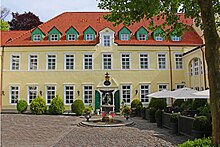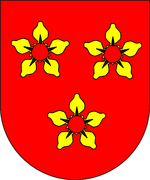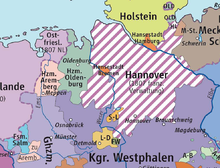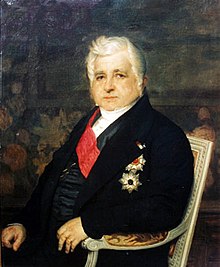Duchy of Arenberg-Meppen
|
||||||||||||||||||||||||||||
The Duchy of Arenberg-Meppen was created in 1803 for the Duke of Arenberg as a replacement for the lost old Duchy of Arenberg on the left bank of the Rhine in the Eifel . It consisted of the Meppen office in Emsland , Vest Recklinghausen in today's Ruhr area and later the area around Dülmen in Münsterland . The country was one of the founders of the Rhine Confederation . In 1810 it was annexed by Napoleon , the "Protector of the Rhine Confederation", and attached to France . In 1815, the Congress of Vienna gave the southern part of the country under the sovereignty of Prussia and the northern part under that of the Kingdom of Hanover . However, the Duke received in both states rights as a nobleman , who were in the Hanoverian part connected to 1875 with significant prerogatives in the judiciary and administration.
sovereignty

As compensation for the loss of the old duchy in the Eifel Duke were Louis Engelbert d'Arenberg from the Feb. 25, 1803 Reichsdeputationshauptschluss the Office Meppen from the Bishopric of Münster and Recklinghausen Vest from the Archbishopric of Cologne awarded a total area of 660 square kilometers with 76,000 inhabitants, from which the new Duchy of Arenberg-Meppen was formed. In the case of Vest Recklinghausen, this development had already become apparent at the end of 1802. Baron vom Stein , who resided in Münster, had tried in vain to acquire this area to round off the Westphalian parts of the Kingdom of Prussia. As early as November 26, 1802, the Duke of Arenberg had practically taken possession of the vest.
Recklinghausen became the capital . Count von Westerholt was appointed governor.
A provisional central authority was replaced by a new government in 1804 with approaches to modernizing the administration. There was no doubt that the duke wanted to eliminate the knighthood and Cologne cathedral chapter in Vest Recklinghausen. The governor's powers were also restricted in favor of the new government. He lost responsibility for the judiciary, for example. A police and judicial office was created for this in Recklinghausen. The central authority has since been divided into the government, the court and the judiciary and police.
On July 12, 1806, Ludwig Engelbert's son, Prosper Ludwig von Arenberg , who had already accepted the duchy by abdicating his father in September 1803, founded the Rhine Confederation together with other princes and Emperor Napoleon . He became so full sovereignty for his duchy, also became his country's domination by the Act of Confederation, the county Croÿ-Dülmen , which was 1,803 newly formed out of office Dülmen of the Bishopric of Munster and covered an area of 6.5 square miles with 8,000 residents, as Standesherrschaft assumed. In 1808/09, the Napoleonic Code was introduced as a civil code.
The central basis of the Code Napoléon was freedom of person and property. This was not compatible with the feudal relationships of dependence of the peasants. In January 1808 the Duke announced that with immediate effect "all bondage and self-authority will be abolished, and from now on no one may lend or accept goods subject to this condition." The personal dependency ended with this, and compulsory service was also lifted. But the previous taxes still existed. "Whatever money or fruit the self-relatives had to deliver to the landlord in this capacity must continue to be paid to him." Although it was progressive compared to the previous situation, the property question remained unsolved. As a result, there was uncertainty among those affected. But even various ordinances did not solve the problem until the transfer of power to the Grand Duchy of Berg .
The Duke participated militarily on Napoleon's side due to the provisions of the Rhine Confederation Act . One reason was that he needed the imperial support because he saw himself threatened by Prussia. The new duchy provided 379 soldiers as part of the Rhine Confederation. The Duke also equipped a light cavalry regiment in Liege. He himself was at the head of the regiment and participated in various campaigns. He was badly wounded in Spain and was taken prisoner by the English, from which he was not released until 1814. Through his marriage to the French princess Stephanie de Tascher de la Pagerie, a niece of the Empress Josephine , he moved in 1808 close to the French imperial family .
Napoleonic annexation
Napoleon's support could not prevent the Duchy of Arenberg from being annexed along with a large part of northwestern Germany . The aim behind this was to make the continental barrier against the United Kingdom of Great Britain and Ireland more effective. Especially from Papenburg , which belonged to the Duchy of Arenberg-Meppen, numerous merchant ships had previously broken through the blockade. Meppen and Dülmen were annexed to France by the imperial French Senatusconsult on December 13, 1810 and mostly incorporated into the Lippe-Département ; the office of Meppen came to the Département de l'Ems-Supérieur . The part of Recklinghausen south of the Lippe , on the other hand, was incorporated into the Grand Duchy of Berg by decree of January 22, 1811 . The operational activities for the integration of the duchy into the First Empire were headed by Théobald Baron de Bacher , the former chargé d'affaires of France at the Confederation of the Rhine.
As compensation for lost income, Prosper Ludwig von Arenberg received hereditary annuities from Napoleon in the amount of 134,000 (for Meppen) and 106,702 francs (for Recklinghausen, to be paid from the state treasury of the Grand Duchy of Berg) in 1813. He also received the title of Duke of France.
Rulership
After Napoleon's defeat in the Battle of Leipzig , Prussian troops also occupied the territory of the Duchy of Arenberg-Meppen, which was annexed by France. It was administered between 1813 and 1815 by the Allied General Government between the Weser and the Rhine .
The annexations of Recklinghausen and Meppens were not revised by the Congress of Vienna in 1815. Recklinghausen, which was incorporated into the Grand Duchy of Berg, and Dülmen came under Prussian sovereignty , Meppen to the Kingdom of Hanover . However, the Duke was granted civil status by the Congress of Vienna , with a virile vote on the Westphalian provincial parliament . A demand made by the Duke against Prussia that he renounce the rulership of Recklinghausen while retaining his property there and instead receive the annuity promised by Napoleon was not granted, but an agreement dated November 29, 1824 granted him an annuity of 13,500 Reichstalers .
From 1826 onwards, the noble area of Meppen within the Kingdom of Hanover was renamed the Duchy of Arenberg-Meppen. Around 1840 it covered 45 square miles with 49,816 inhabitants, the county of Recklinghausen 15 square miles with 40,000 inhabitants.
As a registrar, the duke had considerable rights in the Meppen area. He held the lower jurisdiction, the school inspectorate and the police administration. The land was administered by arenberg officials. This was supervised by the Hanoverian Landdrost in Osnabrück . The area was divided into four media offices. These were the offices of Meppen, Haselünne , Hümmling and Aschendorf .
In 1866 the Kingdom of Hanover, defeated in the German War , was annexed by Prussia, including the area of the former duchy. The special rights assigned to Arenberg according to Hanoverian law were finally abolished by the Prussian state in 1875.
literature
- Gerhard Köbler : Arenberg. In: Historical Lexicon of the German States. The German territories from the Middle Ages to the present. 4th, completely revised edition. CH Beck, Munich 1992, ISBN 3-406-35865-9 , pp. 20f.
- Werner Burghard: "If the farmer pulls ten furrows, there are at least three for the landlord." Problems with the transfer in Vest Recklinghausen 1808–1860 . In: Bert Becker, Horst Lademacher (ed.): Spirit and shape in historical change. Facets of German and European History 1789–1989. Münster, 2000; Pp. 67-92
Web links
- Entry on rheinische-geschichte.lvr.de ( Memento from May 6, 2017 in the Internet Archive )
- Arenberg Foundation ( Memento from March 4, 2016 in the Internet Archive )
- emsland.de
Individual evidence
- ↑ Contract between the Kingdom of Prussia , the Duchy of Oldenburg , the Duchy of Arenberg, the Principality of Salm and the County of Dülmen on the division of the offices of the Principality of Münster Digitalisat (PDF; 1.2 MB)
- ↑ "Existence of the county of Recklinghausen, and change of government of the same" digitized (PDF; 139 kB)
- ^ Gerhard Köbler: Art. Arensberg. In: ders. Historical Lexicon of the German States. The German territories from the Middle Ages to the present. 7th, completely revised edition. CH Beck, Munich 2007, ISBN 978-3-406-54986-1 , p. 23 f.
- ↑ Werner Burghard: "If the farmer pulls ten furrows, there are at least three for the landlord." Problems with the transfer in Vest Recklinghausen 1808–1860. In: Bert Becker, Horst Lademacher (ed.): Spirit and shape in historical change. Facets of German and European History 1789–1989. Münster, 2000; P. 67
- ↑ Werner Burghard: "If the farmer pulls ten furrows, there are at least three for the landlord." Problems with the transfer in Vest Recklinghausen 1808–1860. In: Bert Becker, Horst Lademacher (ed.): Spirit and shape in historical change. Facets of German and European History 1789–1989 . Münster, 2000; P. 68
- ^ Gerhard Köbler: Historical Lexicon of the German Lands. The German territories from the Middle Ages to the present. 7th, completely revised edition. CH Beck, Munich 2007, ISBN 978-3-406-54986-1 , p. 125.
- ↑ Herzoglich Arenbergische Ordinance due to the introduction of the Napoleon Code, January 28, 1808 digitized version (PDF; 134 kB)
- ↑ Werner Burghard: "If the farmer pulls ten furrows, there are at least three for the landlord." Problems with the transfer in Vest Recklinghausen 1808–1860 . In: Bert Becker, Horst Lademacher (ed.): Spirit and shape in historical change. Facets of German and European History 1789–1989. Münster, 2000; P. 69
- ↑ Herzoglich Arenbergische Ordinance on the detachability of feudal relationships, from October 3rd. 1809 digitized version (PDF; 136 kB)
- ^ A b Johann Ludwig Klüber, Public Law of the German Federation and the Federal States , Andreean Buchhandlung, Frankfurt am Main 1840 ( online version at Google Books ), p. 39 note d, p. 889 note b, p. 897 note b




